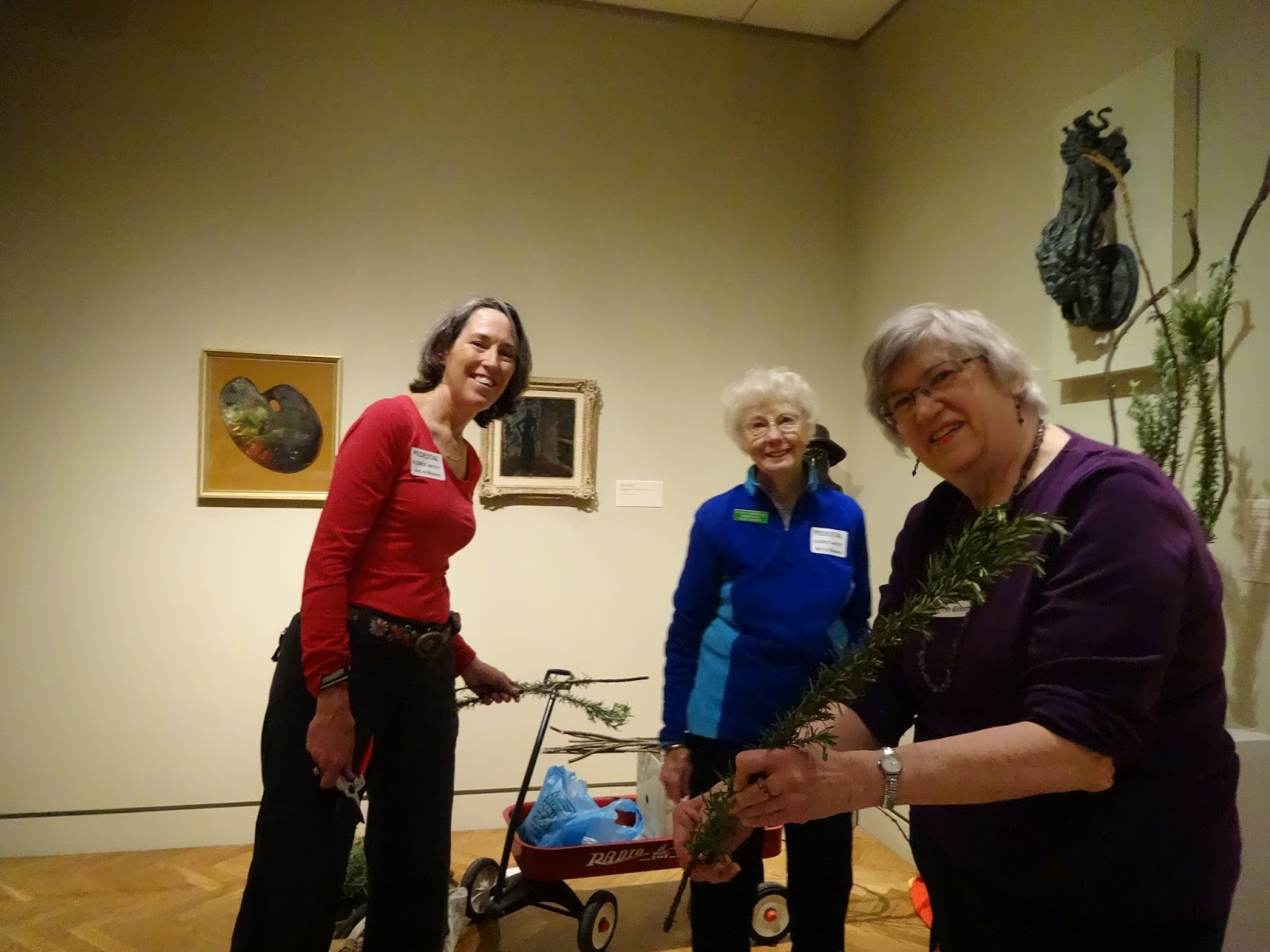 |
| Doorknocker in the form of Medusa's Head by Emile Antoine Bourdelle |
 |
| Gloria, Carla, Elly and Bonnie with our finished arrangement |
We used willow, rosemary, calla lilies, amaranthus, chrysanthemums, erygium thistle, and of course, the Herb of the Year, savory.
Honorary member, Gloria, has been doing Art in Bloom with the Minnesota Herb Society since the event started, 32 years ago! We were so happy to have Gloria's experience and expertise.
 |
| Bonnie, Gloria and Elly get creative (Watch this space to see Gloria charm the socks off a Channel 9 reporter) Minnesota Herb Society’s interpretation of Door Knocker in the form of Medusa’s head
This
Medusa sculpture by Emile Bourdelle, 1925, was of particular interest to one of the members on
our team and therefore, chosen as the piece we would interpret this year. Medusa is from Greek Mythology and could turn
people to stone, even after her head was cut off. She was dark & scary and represented a
feminine power that is often hidden. Our
interpretation tried to represent the aspect of womanhood that is not completely
accepted by society. Many types of
womanhood are acceptable, but this angry, fierce and terrifying goddess (whose
mere gaze can kill) represents that which many women cannot express. While we don’t want to turn people to stone
with our gaze, we can claim our power & gain respect for our strength as
women. We created a
dark interpretation with just a small glint of lightness. This small glint of lightness is the
inspiration that Medusa gives us. She is
a symbol of a strong woman in a culture where images of powerful women are sometimes
few and far between.
As
members of the MN Herb Society, we use herbs in our arrangement. In particular, we choose to feature the 2015
Herb of the Year, Savory. The following represent the herbs we employed. Statements about the use of these herbs are
not intended to represent or imply suitability for treatment of any conditions.
Savory
– The Herb of the Year. There are two
types of Savory. Summer Savory is an
annual, while Winter Savory is a perennial.
They are most commonly used as a culinary herb, frequently paired with
beans. We used this wispy curling herb to
frame Medusa’s face. In ancient times, it was deemed a sovereign remedy for the
colic, a cure for flatulence, and was a good expectorant. Current herbalists
say that a sprig of either of the Savorys rubbed on wasp and bee stings gives
instant relief. Give it a try this
summer if you have an unfortunate incident with our pollinating friends.
Spider
Mums – A member of an autumn favorite, the chrysanthemum. The Chrysanthemum has been used most
predominantly in East Asia to prevent sore throats & fevers. It is also known for making people more
alert, treat the eyes, & circulatory problems such as varicose veins.
Calla Lilies – The deep purple represents
the dried blood of Medusa’s victims.
Amaranth – An ancient grain that is
used in lieu of flour. It has higher
nutritional value than many other grains..
Additionally, the leaves are edible as salad, if not sprayed.
Thistle – Thistle is both thorny &
prickly, but also is beautiful, representative of Medusa’s personality. Thistle
seed can be pressed to create an oil. In
history, thistle was also used as cattle fodder.
Fantail Willow – A member of the Pussy Willow
family. While Fantail is an ornamental
plant, willow is used for it’s bark & roots as a pain killer & anti
fever medication.
Rosemary
– A wonderful culinary herb used with meats, in breads, teas, even
desserts. For me personally, the scent
is loveliest in the midst of a grey winter day. In ancient times, Rosemary had
a reputation for strengthen the memory.
Burning Rosemary in sick chambers or hospitals was said to purify the
air. The name rosemary derives from the Latin
for "dew" (ros) and "sea" (marinus), or
"dew of the sea". Shakespeare
wrote “There's rosemary, that's for remembrance. Pray you, love, remember.”
The
Minnesota Herb Society encourages the study, the growing, & the use of
herbs. We also plant & maintain the
Herb Gardens at the MN Landscape Arboretum.
Meetings are held the 4th Tuesday of January, March, May, August, &
October.
For
further information, check out our blog MNHerbSociety.blogspot.com or contact
dowxx011@umn.edu
|



